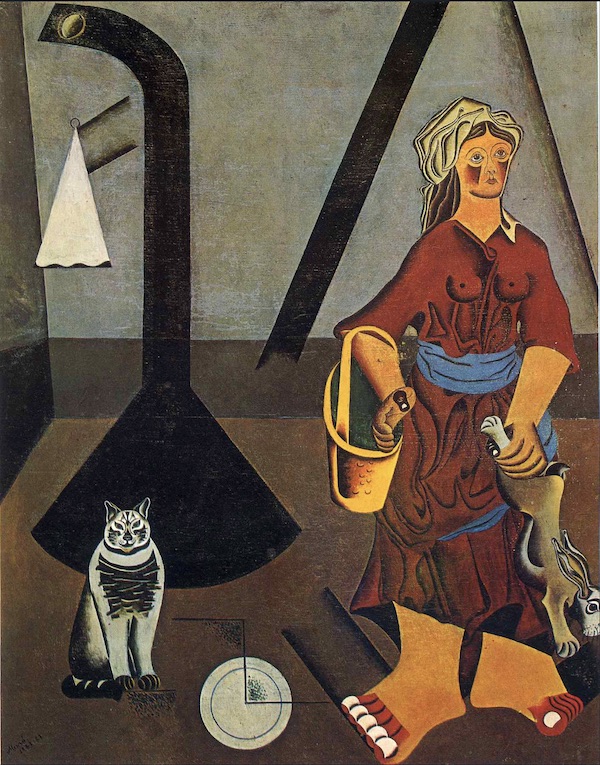
Joan Miró The farmer’s wife 1923

The European division of Russia’s oldest tour operator Intourist started offering winter tour packages to Russia for EU citizens. Package includes: unlimited hot showers, daily visits to Sandunovskaya Banya, and a heated room with electricity.


Permanent deindustrialization
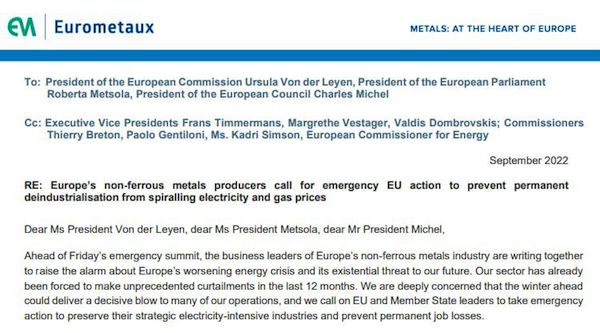
She has to go
NOW – EU will propose a "mandatory target for reducing electricity use at peak hours" in order to "flatten the curve." pic.twitter.com/Q6EuLLTM0L
— Disclose.tv (@disclosetv) September 7, 2022

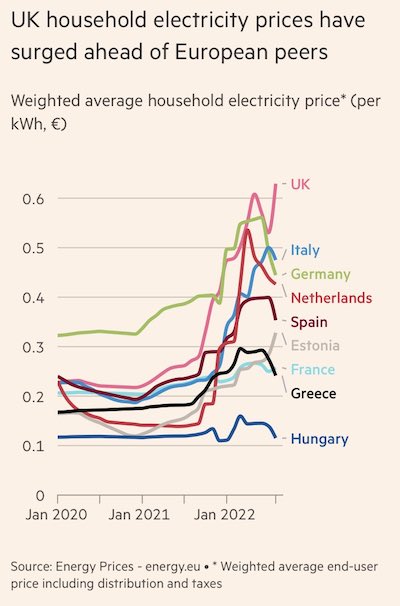

A metaphor for life itself.



“It will be no surprise when the market shares of European businesses, both in the continent and globally, will be taken by their American patrons.”
• Western Elites’ “Sanctions Fever” Will See European People Freeze – Putin (ZH)
Russian President Vladimir Putin blasted the ongoing “sanctions fever” in the West in a wide-ranging speech before the Eastern Economic Forum in Vladivostok, in the country’s far east, where as we described earlier the Chinese delegation was the largest in attendance. Top Chinese legislator Li Zhanshu was in attendance when the Russian leader stressed, “no matter how much someone would like to isolate Russia, it is impossible to do this.” Instead, he said the blowback from EU and US-led sanctions and attempts at decoupling from Russian fossil fuels is wrecking lives in the West. “Now we are seeing how production and jobs in Europe are closing one after another,” Putin said, stressing that this is happening as “Western elites, who would not, or even cannot acknowledge objective facts.”
His theme, like in a number of prior major speeches, was Western elites’ inability to recognize the inevitable shift from a unipolar to multipolar world (literally the name for this year’s forum is “On the Path to a Multipolar World.”), or away from “the world order that benefits only them, forcing everyone to live under the rules, which they invented and which they regularly break and constantly change depending on the situation,” he said according to a state media translation. That they “would not, or even cannot acknowledge objective facts” about global changes reveals their “growing detachment” from the common people they claim to represent. And yet now, European populations could “freeze” while being denied crucial Russian energy by leaders who shortsightedly want to lash out in emotional response to the Ukraine invasion:
“The [coronavirus] epidemic has been replaced by other global challenges that threaten the entire world,” Putin told the Eastern Economic Forum in Russia’s Pacific port city of Vladivostok. “I’m referring to the West’s sanctions fever,” he said, criticizing “blatant and aggressive” attempts to “subjugate” countries that have not imposed economic restrictions on Russia. He dismissed as “nonsense” the widespread allegations that Russia using gas as an energy weapon, saying it’s as simple as releasing the necessary parts for the safe and proper functioning of pipelines operated by Gazprom. “Give us turbines and we’ll turn on Nord Stream tomorrow, but they won’t give us anything,” Putin told the audience, further addressing the latest global headlines of an EU-mulled price cap on Russian oil and gas, calling the proposal “another stupidity.”
He suggested the dilemma remains simple: “There are contractual obligations and if there are any political decisions that contradict them, then we simply won’t fulfill them. We won’t supply anything at all if it contradicts our economic interests, in this case. We won’t supply gas, oil, coal or heating oil.” Part of the aforementioned objective facts Western leaders refuse to acknowledge is that nations importing Russian energy “are in no position to dictate their will.” Putin said he’s still “confident we haven’t lost anything and won’t lose anything [after invading Ukraine]. Our main gain is strengthening sovereignty.” s
Putin Ukraine grain
Putin suggests limiting the export of Ukrainian grain to Europe, accusing EU “colonialists” of hoarding shipments and deceiving the poorest countries. pic.twitter.com/WBc5Dgx0p6
— Putin Direct (@PutinDirect) September 7, 2022

A former communist country teaches former capitalist countries lessons on markets.
• EU Gas Price Cap Plan Is ‘Foolish’ – Putin (RT)
The proposal by the EU to place a price cap on Russian natural gas imports is a foolish, non-market-oriented plan that has no future, Russian President Vladimir Putin said on Wednesday. “Faced with what is happening now, EU politicians are thinking how to get away with it [paying market prices for gas], and to limit the price by administrative decisions. Another foolish notion, nonsense that will lead to further price increases in the global markets, including Europe,” Putin said during a plenary session of the Eastern Economic Forum (EEF). According to the president, it is impossible to solve anything to do with the economy and world trade with administrative decisions, which “only lead to distortions and higher prices.”
Putin stressed that the situation in the gas market is the result of sanctions and other actions taken by Brussels, including the switch to spot-market trading, while Russia has always preferred long-term contracts for gas exports. “We have always insisted that prices be formed on the basis of long-term contracts and be tied to such a market category as the price of oil and petroleum products… The EU forced us to link to spot prices. Now they’re trying to backtrack by setting price caps,” he said. According to Putin, accusing Russia of using energy as a weapon is “nonsense.” He stressed that Russia fulfills its contracts, while the current supply shortages are the result of decisions made by other countries – including Ukraine, which shut down one of its gas transit pipelines; Poland, which also shut down part of its section of the pipeline; and Canada, which delayed the maintenance of turbines for the Nord Stream 1 pipeline.
The president added that Russia is still willing to supply energy to those who need it, though Moscow no longer considers the EU to be its main export destination. “By receiving natural gas from Russia, the economies of the leading European countries have for decades enjoyed obvious competitive advantages,” Putin said, in reference to the lower gas costs paid under long-term contracts. “If they think that they don’t need these advantages, that does not bother us at all, because the need for energy resources in the world is huge.”

“..a political tool, not a solution to the energy crisis..”
• Czech Republic Weighs In On Russian Gas Price Cap (RT)
The Czech Republic will seek to take the issue of imposing a price cap on Russian gas off the agenda of an upcoming meeting of EU energy ministers, the nation’s minister of industry, Jozef Sikela, said on Wednesday. Speaking to the country’s Senate committee on the economy, Sikela indicated that he doesn’t want to discuss the issue at the meeting because it is “a political tool, not a solution to the energy crisis.” “It is not a constructive proposal, according to me. It is more another way to sanction Russia than an actual solution to the energy crisis in Europe,” he stressed.
On Friday, EU energy ministers are set to meet in Brussels to discuss how to rein in soaring energy prices. According to Sikela, among the issues he wants to raise is potentially separating electricity and gas prices. Doing so, he said, may lower electricity prices for the general public. The Czech minister said the recent shutdown of the Nord Stream 1 pipeline did not come as a surprise to him. “It’s part of the energy war we’re in… The decisive battle will be fought this winter,” he stated, adding that the country has done its best to prepare for it. “However, prices will go down only when Europe finds a way to break away from gas,” he reiterated.
On August 31, Gazprom completely shut down the Nord Stream 1 gas pipeline, later announcing that it would remain closed indefinitely due to an oil leak in the turbine. This malfunction can only be remedied in Canada, which has imposed sanctions against Moscow. The technical issues on the main gas supply route to the EU have resulted in skyrocketing gas prices, exacerbating the energy crunch on the continent. Sikela’s comments come on the heels of massive protests in Prague that erupted this past weekend. Demonstrators urged the government to resign over high energy prices and inflation, with demands also having been heard to drop anti-Russia sanctions.

NATO won’t let go of its new-found reason to exist. Perpetual war it is. Ergo: Stoltenberg must go. And no, NATO pays no price: the people do.
• NATO Will Pay A Price But We Must Stay The Course On Ukraine (Stoltenberg)
The war in Ukraine is entering a critical phase. Winter is coming and it will be hard. Hard for the Ukrainian people and armed forces who are fighting for their freedom, and hard for those of us who support them. Our unity and solidarity will be seriously tested, as families and businesses feel the crunch of soaring energy prices and costs of living caused by Russia’s brutal invasion. We face a difficult six months, with the threat of energy cuts, disruptions and perhaps even civil unrest. But we must stay the course and stand up to tyranny — for Ukraine’s sake and for ours. We do pay a price for our support to Ukraine. But the price we pay is counted in dollars, euros and pounds, while Ukrainians are paying with their lives. And all of us will pay a much higher price if Russia and other authoritarian regimes believe they can invade their neighbours and trample on international law with impunity.
If Russia stops fighting, there will be peace. If Ukraine stops fighting, it will cease to exist as an independent nation. We have a moral responsibility to support this independent democracy at the heart of Europe. The price we pay in supporting Ukraine also benefits our own security. Vladimir Putin has clearly stated that he wants to wipe the country from the map and rewrite the European security order. Russia is temporarily occupying about 20 per cent of Ukraine — four times the size of Belgium, or half of the UK. Emboldened by any success, Russia could risk further aggression against other neighbours, and even an attack on Nato allies.
So we have a choice to make about the world we want to live in. Nato allies are committed to each nation’s right to choose its own destiny. That is why we are providing unprecedented financial, humanitarian and military assistance to help Ukraine prevail as a sovereign independent nation. Since Russia’s illegal annexation of Crimea in 2014, allied countries have provided billions of dollars of support for Ukraine’s security sector and institutions, and trained tens of thousands of troops, including special forces. This helped to make the Ukrainian armed forces stronger, better led and better prepared for Russia’s renewed invasion.
Since February, allies have rallied to Ukraine’s side with unprecedented military, humanitarian and financial support. In June, Nato leaders agreed a strengthened package of assistance, with fuel, food, medical supplies, military gear, secure communications and equipment to counter mines and drones. We are preparing more than a dozen new projects to help Ukraine face the winter. And we will continue to help the country strengthen its defence and security sector for the longer term, and transition from Soviet-era weapons to Nato-standard capabilities.
Hillary
NEW – Hillary Clinton says Ukraine "is now on offense. We have to keep supporting them, helping them."
"Zelenskyy has been a true wartime leader."pic.twitter.com/YiQ0ThIJuW
— Disclose.tv (@disclosetv) September 7, 2022

“They’re just the ones not rich enough, clever enough, or fast enough to elude the conscription gangs..”
• “Counter-Offensive” – You Keep Using That Word (Schryver)
One thing few seem to appreciate is that what Ukraine has done over the past several days near Kherson and Kharkov does not even come close to what constitutes a “counter-offensive”. They’ve done nothing but launch highly localized severely under-powered probes which, sooner than later, become nothing but cramped kill zones for massed Russian artillery and air strikes. The leaders of the Armed Forces of Ukraine now command: effectively zero air power, sparse artillery with acute ammo shortages, limited UAV capability – and, to add insult to injury, Russian “battlefield hackers” are now proving able to commandeer many of their precious quadcopter surveillance drones, thereby blinding them completely in the midst of a battle.
Worst of all, the overwhelming majority of the soldiers are battle-naïve conscripts. Their tanks are few and far between; their troop carriers are obsolete and highly vulnerable; many if not most are compelled to march into battle on foot – and these are not Seal Team 6 physical specimens who do 20k runs on their day off. They’re just the ones not rich enough, clever enough, or fast enough to elude the conscription gangs. The AFU’s sole apparent advantage is that there are substantially more of them that can be brought to bear on a narrow front than there are Russians defending it. And yet all of these attacks so far have been tentative affairs with relatively small concentrations of force and firepower.
In the lexicon of battle, a “counter-offensive” is an entirely different animal. The German Ardennes counter-offensive in December 1944 consisted of: ~400,000 troops ~500 tanks ~700 mobile artillery ~1300 troop carriers, 4000+ artillery pieces, 1000+ aircraft THAT was a counter-offensive. The Tet Offensive in Vietnam consisted of 300,000+ troops attacking more or less simultaneously. What we are witnessing in Ukraine is categorically NOT a “counter-offensive”. Ukrainian operations over the past several days are, to the contrary, strongly indicative of the extremely limited mobility and firepower capacity of a severely depleted army whose combat-effectiveness is a fraction of the Russian and allied defenders whom they face on the field.
Oh, to be sure, their numerical superiority in troops can achieve a temporary advance within a narrow salient, and inflict some serious harm on isolated groups of Russian defenders in the process. That should come as no surprise to anyone – particularly the abundant Russian “doomers’ on Telegram who descend into inexplicable despair whenever the Ukrainians achieve any tactical success, however meagre and strategically meaningless. However, if you zoom out the map to reveal the entire front line of this war, you can readily see that we’re talking about a handful of teeny-weeny pimples protruding into the Russian-held side: territory in which the Russians have numerous highly mobile operational reserve units – infantry and artillery – that can be dispatched with relative alacrity to any quadrant of the battle map, utilizing the always significant advantage of interior lines of communication.

“..Putin noted that the agency is under pressure from the US and other Western nations, and therefore cannot directly accuse Kiev of attacking the nuclear plant. ..”
• Putin Comments On IAEA Report (RT)
The International Atomic Energy Agency (IAEA) can’t openly state that the attacks on the Zaporozhye Nuclear Power Plant (ZNPP) are being carried out by Kiev, Russian President Vladimir Putin has said. Speaking at the Eastern Economic Forum in Vladivostok on Wednesday, the Russian leader praised the agency as being a responsible international organization with a very professional leader, and stated that he trusts the IAEA’s latest report on the ZNPP. However, Putin noted that the agency is under pressure from the US and other Western nations, and therefore cannot directly accuse Kiev of attacking the nuclear plant.
“But this is obvious. We control the station, our servicemen are stationed there. What, are we attacking ourselves?” Putin said, calling the notion completely absurd and adding that the area around the power plant is littered with the remains of HIMARS rockets and other Western munitions. Putin also addressed the IAEA’s request that Russia remove its military equipment from the premises of the ZNPP. He insisted that there is no such equipment at the plant and explained that the only forces stationed there are the Russian National Guard, which is protecting the perimeter and the premises of the station itself. “We can even call journalists there tomorrow, including European and American journalists, to see for themselves,” Putin said, noting that it is obvious the strikes on the power plant and the city of Energodar are coming from across the reservoir where Kiev’s forces are located.
Putin further explained that Russia’s military equipment, which is engaged in counter-battery combat, is not located anywhere near the station and has in fact been moved quite far beyond the perimeter of the facility. The Russian leader also expressed his bewilderment at Kiev’s attempts to create a nuclear catastrophe by attacking the power plant, stating that “the Ukrainian side is creating threats to undermine nuclear security.” “Why they do this, I honestly don’t really understand. Just to draw more attention to their situation and create an additional crisis?” He also revealed that Kiev’s operatives have attempted to carry out terrorist attacks on Russian territory, targeting high-voltage power lines connected to Russian nuclear power facilities.
“They purposefully work in this direction. What for? What is the point of creating a nuclear threat for the whole of Europe? I do not really understand, but they are doing this.” Putin’s comments come after the IAEA released a report on Tuesday regarding the state of the Russian-controlled Zaporozhye Nuclear Power Plant in Ukraine. The agency demanded that all attacks on the facility “be stopped immediately”and called for a cessation of any military activity within or in the vicinity of the plant. The report did not identify those responsible for shelling the plant.

“They [Europeans] even believe that it is the bad Russians that have closed the tap of oil and gas, while it is our own leaders in Europe that have stupidly imposed these sanctions..”
• Charles Gave: Europeans Are “Mad With Anger And it Will Worsen” (SN)
Predicting that cost of living protests in the Czech Republic and Germany will spread around the continent, a prominent economist warns that European citizens are “mad with anger and it will worsen.” On Saturday, over 70,000 people took to the streets of Prague to demand an end to weapons supplies and neutrality regarding the conflict in Ukraine. Numerous demonstrations are also set to take place in major German cities over the next month as energy bills and inflation soar as a result of sanctions on Russia and over dependence on green energy. “The demonstrations in Prague and Germany are only the beginning. The price of gas and consequently of electricity are driving the European citizens mad with anger and it will worsen,” French economist Charles Gave told Sputnik.
Gave went on to assert that many Europeans aren’t buying the narrative that the situation, which culminated in the shut down of gas supplies to Europe via the Nord Stream 1 pipeline, is all Vladimir Putin’s fault. “The European governments and the European Commission speak of a ‘manipulation’ by Russia, but people perceive very well that the decision to stop importing Russian gas and oil was a European decision, taken by Brussels without even thinking of the impact it will have on the European economy,” he said. The economist blasted European leaders for their obsession with net zero and climate change hysteria, which has left the continent totally lacking in self-sufficiency.
“For the last 15 years, our European leaders have gone into a climate craze, promoting magic mirrors and windmills as the solution. It does not work. These solutions demand the same capacity in gas power plants,” Gave said. The economist firmly blamed globalist technocrat leaders for sacrificing the interests of Europeans on the altar of prolonging a war that will cause economic devastation. “They [Europeans] even believe that it is the bad Russians that have closed the tap of oil and gas, while it is our own leaders in Europe that have stupidly imposed these sanctions that are destroying the European economy. We, Europeans, are bringing stagflation onto our head. Before the people realize it, it will be too late. Macron, [German Chancellor Olaf] Scholz, von der Leyen and the like will never admit they were wrong and present excuses,” he asserted.

“Zakharova later mocked what she called the “mind-blowing stupidity” of Truss.”
• Truss Becoming PM Signals ‘Crisis Of Democracy’ In UK – Moscow (RT)
The selection of Liz Truss as prime minister signals a “crisis of democracy” in the UK, Russian Foreign Ministry spokeswoman Maria Zakharova said on Wednesday. Asked by TASS whether Truss will be a disaster for Britain, Zakharova replied that if “shop owners are decorating the window in this way, then they believe this is the best item they have in stock today.” Sometimes, the spokeswoman claimed, countries with large populations and long-standing democratic traditions make you wonder if they really do not have anyone that can “adequately, professionally, and intelligently represent the various branches of government.” Perhaps the problem is in the crisis of British democracy, because this ‘result’ has nothing to do with the direct choice of the British people, since the system of indirect elections dominates the Anglo-Saxon duo.
Truss, formerly the foreign secretary in Boris Johnson’s Conservative government, officially became prime minister on Tuesday. The day before, she was revealed as the winner of the Tory leadership election. She received 81,326 voters, while her competitor, former Chancellor Rishi Sunak, was backed by 60,399. A YouGov poll published on the same day showed that half of the people in the UK are ‘disappointed’ about Truss taking over as prime minister, with one-third ‘very disappointed.’ Even among members of the ruling party, 54% do not have much confidence in Truss’ ability to tackle the cost-of-living crisis, and around one-third are ‘disappointed’ that she will lead the government.
Truss’ visit to Russia in February – amid tensions in Ukraine in the run-up to the launch of Moscow’s military operation – was remembered by many for a gaffe made by the then-foreign secretary. Truss confused the Russian regions of Voronezh and Rostov with Ukrainian regions, and told her counterpart, Sergey Lavrov, that London would never recognize Russia’s sovereignty over these areas. According to reports, she was then allegedly corrected by Deborah Bronnert, the UK ambassador. Lavrov described the meeting with the foreign secretary as talking “to a deaf person.” Zakharova later mocked what she called the “mind-blowing stupidity” of Truss.

Ha ha! “It seems that in Britain, which is famous for its traditions, a new tradition has emerged..”
• ‘One Freak After Another’ – Ex-Russian President On UK Leaders (RT)
Former Russian President Dmitry Medvedev has said the new UK prime minister, Liz Truss, will continue the “tradition” started by her predecessor Boris Johnson by finishing her tenure “in disgrace.”Truss, formerly the foreign secretary in Johnson’s Conservative government, officially became prime minister on Tuesday. Taking to Telegram on Wednesday, Medvedev, who currently serves as deputy chairman of Russia’s Security Council, commented on the succession of governments in the UK: “Out goes the freak guy, in comes the freak lady.” He described the new PM as “an incompetent and mediocre thermonuclear Russophobe who has no elementary ideas about politics, history, geography, but wants to defeat Russia in everything.”
The former president added that Truss, the third female prime minister in British history, is trying to imitate the first, Margaret Thatcher, “without having even 5% of her abilities,” and hopes to address the energy crisis and rising food inflation, which are “the result of her own crazy sanctions exercises.” In her first statement at Downing Street, Truss claimed that the energy crisis was caused by “Putin’s war.” “She will quarrel with everyone, fail in everything, and leave in disgrace, like her predecessor, shaggy Boriska. It seems that in Britain, which is famous for its traditions, a new tradition has emerged,” Medvedev wrote.

Still not. “Highly indebted—with a large percentage of their income being used to service debt—Chinese households simply do not have the financial flexibility to ramp up spending.”
• Can China Transition to a Consumption Economy? (Balding)
The great economist Michael Pettis at Tsinghua University has noted for years the importance for the Chinese economy to shift its growth dependency away from investment and toward greater consumption. As China faces its weakest sustained economic period in modern history, it bears worth asking, can China shift toward a more consumer-focused economy? The Chinese economy is unique among major economies due to its low share of the household sector within the macroeconomy. Most economies typically have a household sector that accounts for 60-75 percent of activity. The United States, for example, hovers around 70 percent. In China, however, households account for only about 45 percent. This difference creates a wide variety of problems, from misunderstanding basic economic data to how to solve policy problems like shifting activity.
The first problem this creates is when analysts compare cross-country data on debt to GDP in various formats, such as household debt to GDP. Due to the starkly different shares of income between households in China and other countries, Chinese households have significantly less income to repay debts than households in other countries. In fact, if we adjust household debt levels for household income rather than GDP, Chinese households are some of the most indebted in the world, even more than the United States and most OECD countries paying a significantly higher share of their income toward debt servicing due to interest rate differentials.
This simple, often overlooked adjustment has significant implications for how we conceptualize a move away from the investment infrastructure-driven growth model toward a consumption-driven growth model. While the 45 percent household share gives the superficial appearance that Chinese consumption can increase significantly, the reality is very different. The Chinese consumer simply does not have the financial capability to increase consumption share. Real estate sales are down with nominal sales of retail goods and services flat, meaning that after accounting for surging inflation, Chinese consumers are purchasing less than they did a year ago. Highly indebted—with a large percentage of their income being used to service debt—Chinese households simply do not have the financial flexibility to ramp up spending.

“I went home, contemplated it for a weekend, and thought, ‘I’m not looking at this as carefully as I need to look at it.’”
• Why Disney Didn’t Buy Twitter (Vox)
Elon Musk wanted to buy Twitter. Then he decided he didn’t. Bob Iger can relate. In 2016, Iger, then the CEO of Disney, had convinced himself that his company should own Twitter because it would be an excellent way to distribute Disney’s content around the world. Then, shortly before the 2016 US presidential election, he bailed out. Iger has told parts of this story before, but it always seemed confusing to me: In his 2019 memoir, he said the boards of both Disney and Twitter had agreed to the deal, but then he had second thoughts because of the “nastiness” rampant at Twitter. Really? Wasn’t the nastiness readily apparent to anyone who’d ever used the service for a second, let alone to someone who was ready to spend billions on it?
But today we got a longer version of the story, relayed by Iger at the Code Conference, in response to a question from The Verge’s Alex Heath. In this one, Iger says that Twitter would have been a “phenomenal” distribution platform for Disney but that it would have come with too many headaches. Among them: bots. (Sound familiar?) Here’s Iger, in his own words: “We were intent on going into the streaming business. We needed a technology solution. We have all this great IP. We weren’t a technology company. How do we get that IP to consumers around the world? … And we were kicking tires left and right. We thought about developing ourselves. Five years, $500 million. It wasn’t the money, it was the time, because the world was changing fast. And at the same time, we heard that Twitter was contemplating a sale.
“We enter the process immediately, looking at Twitter as the solution: a global distribution platform. It was viewed as sort of a social network. We were viewing it as something completely different. We could put news, sports, entertainment, [and] reach the world. And frankly, it would have been a phenomenal solution, distribution-wise. “Then, after we sold the whole concept to the Disney board and the Twitter board, and we’re really ready to execute — the negotiation was just about done — I went home, contemplated it for a weekend, and thought, ‘I’m not looking at this as carefully as I need to look at it.’ Yes, it’s a great solution from a distribution perspective. But it would come with so many other challenges and complexities that as a manager of a great global brand, I was not prepared to take on a major distraction and having to manage circumstances that weren’t even close to anything that we had faced before.
“Interestingly enough, because I read the news these days, we did look very carefully at all of the Twitter users — I guess they’re called users? — and we at that point estimated with some of Twitter’s help that a substantial portion — not a majority — were not real. “I don’t remember the number but we discounted the value heavily. But that was built into our economics. Actually, the deal that we had was pretty cheap. “Then you have to look, of course, at all the hate speech and potential to do as much harm as good. We’re in the business of manufacturing fun at Disney — of doing nothing but good, even though there are others today that criticize Disney for the opposite, which is wrong. This was just something that we were not ready to take on and I was not ready to take on as the CEO of a company and I thought it would have been irresponsible.”

“Doughty ordered Fauci and Jean-Pierre to comply within 21 days.”
• Judge Orders Fauci, Others to Produce Records For Censorship Lawsuit (ET)
Dr. Anthony Fauci, White House press secretary Karine Jean-Pierre, and other top Biden administration officials who were resisting efforts to obtain their communications with Big Tech companies must hand over the records, a federal judge ruled on Sept. 6. U.S. District Judge Terry Doughty, a Trump appointee, ordered the government to quickly produce documents after it was sued by the attorneys general of Louisiana and Missouri over alleged collusion with Big Tech firms such as Facebook. The initial tranche of discovery, released on Aug. 31, revealed that more than 50 government officials across a dozen agencies were involved in applying pressure to social media companies to censor users.
But some of the officials refused to provide any answers or answer all questions posed by the plaintiffs. Among them: Fauci, who serves as director of the National Institute of Allergy and Infectious Diseases (NIAID) and chief medical adviser to President Joe Biden. The government claimed that Fauci shouldn’t be required to answer all questions or provide records in his capacity as NIAID director or in his capacity as Biden’s chief medical adviser. It also attempted to withhold records and responses from Jean-Pierre. In the new ruling on Sept. 6 breaking the stalemate, Doughty said both Fauci and Jean-Pierre needed to comply with the interrogatories and record requests.
“First, the requested information is obviously very relevant to Plaintiffs’ claims. Dr. Fauci’s communications would be relevant to Plaintiffs’ allegations in reference to alleged suppression of speech relating to the lab-leak theory of COVID-19’s origin, and to alleged suppression of speech about the efficiency of masks and COVID-19 lockdowns. Jean-Pierre’s communications as White House Press Secretary could be relevant to all of Plaintiffs’ examples,” Doughty said, referring to examples such as the suppression of the Hunter Biden laptop story ahead of the 2020 presidential election and censorship of claims COVID-19 originated in a Chinese laboratory. Doughty ordered Fauci and Jean-Pierre to comply within 21 days.
Fauci, additionally, must provide complete answers to questions regarding his role as NIAID director. “We know from the previous round of discovery that efforts to censor the speech of those who disagree with the government on covid policy have come from the top. Americans deserve to know Anthony Fauci’s participation in this enterprise, especially since he has publicly demanded that specific individuals, including two of our clients, Jay Bhattacharya and Martin Kulldorff, be censored on social media,” Jenin Younes, litigation counsel for the New Civil Liberties Alliance and a lawyer for some of the plaintiffs, said in a statement. “It is time for Dr. Fauci to answer for his flagrant disregard for Americans’ constitutional rights and civil liberties.”

A pattern of judges fighting back?!
• Former FBI Boss Warns Trump Search Warrant Might Be Tossed Out Entirely (JTN)
The FBI warrant to search former President Trump’s home in Mar-a-Lago may be thrown out entirely in court, according to former FBI boss Kevin Brock. News broke over Labor Day weekend that Trump had been granted a legal win when a federal judge ordered a special master to review the documents seized from Trump’s home. “I think the government would be concerned as well, because there’s concern that the the search warrant itself was overly broad from the get-go,” Kevin Brock said on “Just the News, Not Noise” Tuesday evening. “Because the scope that they were looking for was every single document generated during the Trump administration — that just seems too inexcusably overbroad.
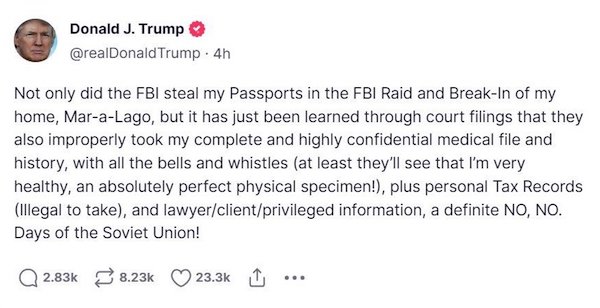
Now there’s indications that they (the FBI) collected much more than they were authorized to collect.” Brock said that he believes that the search warrant could be suppressed entirely. “If I’m a prosecutor, I am concerned going forward that this search warrant could be suppressed and for those types of reasons, and they would lose access to anything that was collected throughout the search as a fruit of the poisonous tree,” Brock continued. “So I think that’s got to be in the back of their minds.” Brock also criticized how the FBI raided Trump’s home and how usually when the FBI does investigations, they try to take the least intrusive route possible at first.
“You go into a home, you set up a system where those things that you seize are assiduously documented,” said Brock, explaining how FBI searches typically work. “They’re given a specific tracking number, a barcode and each piece is gone through meticulously before you leave the premises to make sure that it’s within the scope of the document.” “And that’s only part one,” he continued. “Part two is the warrant is not to be overly broad as to what parts of the residence can be searched. You can only search those things where it’s reasonably expected you would find the type of evidence that you are looking for.”
Webb – Peter Strzok
Unprecedented DOJ misconduct demands Injunction to shut investigation down and sanction DOJ. Trump needs to fire back with misconduct lawsuit. pic.twitter.com/jfA9UhVZMI
— George Webb – Investigative Journalist (@RealGeorgeWebb1) September 7, 2022

Well, they try: “..several hundred million dollars’ worth of cyber warheads..” “The average tweet received 0.49 likes and 0.02 retweets.”
• The US Army Special Operations Command Weaponizes Social Media (Helmer)
The US Army’s Special Operations Command (SOCOM) has been firing several hundred million dollars’ worth of cyber warheads at Russian targets from its headquarters at MacDill Airforce Base in Florida. They have all been duds. The weapons, the source, and their failure to strike effectively have been exposed in a new report, published on August 24, by the Cyber Policy Center of the Stanford Internet Observatory. The title of the 54-page study is “Unheard Voice: Evaluating Five Years of Pro-Western Covert Influence Operations”.
“We believe”, the report concludes, “this activity represents the most extensive case of covert pro-Western IO [influence operations] on social media to be reviewed and analyzed by open-source researchers to date… the data also shows the limitations of using inauthentic tactics to generate engagement and build influence online. The vast majority of posts and tweets we reviewed received no more than a handful of likes or retweets, and only 19% of the covert assets we identified had more than 1,000 followers. The average tweet received 0.49 likes and 0.02 retweets.” “Tellingly,” according to the Stanford report, “the two most followed assets in the data provided by Twitter were overt accounts that publicly declared a connection to the U.S. military.”
The report comes from a branch of Stanford University, and is funded by the Stanford Law School and the Spogli Institute for Institutional Studies, headed by Michael McFaul (lead image). McFaul, once a US ambassador to Moscow, has been a career advocate of war against Russia. The new report exposes many of McFaul’s allegations to be crude fabrications and propaganda which the Special Operations Command (SOCOM) has been paying contractors to fire at Russia for a decade. Strangely, there is no mention in the report of the US Army, Pentagon, the Special Operations Command, or its principal cyberwar contractor, the Rendon Group.
It is unclear who paid for the new investigation which was co-authored by Graphika. This is a New York consultancy without an office address, staffed by US, French and British intelligence analysts, and financed in part by the US Senate Intelligence Committee and the Pentagon’s Defense Advanced Research Projects Agency (DARPA). Graphika advertises its Russia war-making credentials in the mainstream and IT media, as well as on its Twitter account. Notwithstanding, the new report explicitly targets news faking and other information warfare tactics by the US Army forces aimed primarily at audiences in Central Asia, the Middle East, and Afghanistan.

“..to lead the White Races of the world in a final crusade for their survival, a crusade against the Semite-led Untermenschen.”
• Silencing the Lambs — How Propaganda Works (John Pilger)
At its summit in Madrid in June, NATO, which is controlled by the United States, adopted a strategy document that militarises the European continent, and escalates the prospect of war with Russia and China. It proposes “multi domain warfighting against nuclear-armed peer-competitor.” In other words, nuclear war. It says: “NATO’s enlargement has been an historic success.” I read that in disbelief. The news from the war in Ukraine is mostly not news, but a one-sided litany of jingoism, distortion, omission. I have reported a number of wars and have never known such blanket propaganda.
In February, Russia invaded Ukraine as a response to almost eight years of killing and criminal destruction in the Russian-speaking region of Donbass on their border. In 2014, the United States had sponsored a coup in Kiev that got rid of Ukraine’s democratically elected, Russian-friendly president and installed a successor whom the Americans made clear was their man. In recent years, American “defender” missiles have been installed in eastern Europe, Poland, Slovenia, the Czech Republic, almost certainly aimed at Russia, accompanied by false assurances all the way back to James Baker’s “promise” to Soviet leader Mikhail Gorbachev in February 1990 that NATO would never expand beyond Germany.
Ukraine is the frontline. NATO has effectively reached the very borderland through which Hitler’s army stormed in 1941, leaving more than 23 million dead in the Soviet Union. Last December, Russia proposed a far-reaching security plan for Europe. This was dismissed, derided or suppressed in the Western media. Who read its step-by-step proposals? On Feb. 24, President Volodymyr Zelensky threatened to develop nuclear weapons unless America armed and protected Ukraine. On the same day, Russia invaded — an unprovoked act of congenital infamy, according to the Western media. The history, the lies, the peace proposals, the solemn agreements on Donbass at Minsk counted for nothing.
On April 25, U.S. Defense Secretary Lloyd Austin flew into Kiev and confirmed that America’s aim was to destroy the Russian Federation — the word he used was “weaken.” America had got the war it wanted, waged by an American bankrolled and armed proxy and expendable pawn. Almost none of this was explained to Western audiences. Russia’s invasion of Ukraine is wanton and inexcusable. It is a crime to invade a sovereign country. There are no “buts” — except one. When did the present war in Ukraine begin and who started it? According to the United Nations, between 2014 and this year, some 14,000 people have been killed in the Kiev regime’s civil war on the Donbass. Many of the attacks were carried out by neo-Nazis.
In the same month, dozens of Russian-speaking people were burned alive or suffocated in a trade union building in Odessa besieged by fascist thugs, the followers of the Nazi collaborator and anti-Semitic fanatic Stepan Bandera. The New York Times called the thugs “nationalists.” “The historic mission of our nation in this critical moment,” said Andreiy Biletsky, founder of the Azov Battaltion, “is to lead the White Races of the world in a final crusade for their survival, a crusade against the Semite-led Untermenschen.”

“I have the impression that Zelensky took Salvini as a model; the same beard, the same style of dressing in sweatshirts, the same populist rhetoric. Not the Nutella, though.”
• The Rise of the Key Opinion Leaders: End of Politics as we Know it? (Ugo Bardi)
In ancient Japan, a “kagemusha” (shadow warrior) was an impersonator who took the aspect and the role of the actual leader. It was simply a decoy to be used in battle but, in our times, the problem for leaders is not so much to avoid bullets but to avoid the much more powerful propaganda techniques that may destroy them. The result is the rise of a new kind of kagemusha, the KOLs (Key Opinion Leaders). The KOLs do not impersonate the true leaders, but express their ideas and plans in public, taking the blame for the failures and the mistakes that may result. The real leaders, instead, remain in the shadows. The KOLs operate in many fields, not just in politics. For instance, they are popular in science. But, their presence in politics is becoming more and more evident.
[..] The KOLs may now be spilling into politics. The first actor to become a high-rank politician was Ronald Reagan, but he was far from being a “puppet president”, although he profited from his experience as an actor to manage his public image. In recent times, though, we are seeing actors becoming frontmen for figures who remain backstage. A good example is Vladimir Zelensky, president of Ukraine. Independently of what you think of what’s happening in Ukraine, Zelensky is clearly a modern kagemusha: an actor playing the role of the president. The way he dresses, the short beard, the posture, all are part of a character that could have starred in a movie, except that the war in Ukraine is all too real. Because of the dangers involved in the current situation, it is understandable that the Ukrainian powers that be much prefer a kagemusha as president rather than to appear themselves on stage.
So far, Zelensky remains a relatively isolated case. But it is possible that the KOL fashion will spread to other countries and other leaders. As an example, I can cite Mr. Matteo Salvini in Italy. As the leader of the League, he became deputy prime minister in 2018, and he is still a member of parliament. Salvini is popularly known in Italy as “Captain Nutella,” owing to his penchant to present a public image of himself while eating junk food. He was never an actor, but he started his career as a participant in a TV game show, and he does not have much more than that in his professional CV (**). Incidentally, I have the impression that Zelensky took Salvini as a model; the same beard, the same style of dressing in sweatshirts, the same populist rhetoric. Not the Nutella, though.
I would not be surprised if Salvini, or some other equally shallow kagemusha-style character, will soon take the job of the prime minister of Italy. This winter we are going to see a serious crisis in which many Italians will find themselves without heating at home and with no fuel, no electric power, and no jobs. At that point, the Nutella will hit the fan, as they say. I don’t envy the person who will find him or herself in the role of the prime minister at that moment. The job could become as dangerous in Italy as it is in Ukraine now and, as you know, in Italy we already had a case of a prime minister hanged upside-down. Surely, during the coming hard times, the really powerful people will prefer to take a low-profile role.

Steve has tons of graphs. Of course.
• Vaccines Are Taking An Average Of 5 Months To Kill People (Kirsch)
The key point is this: The UK data shows statistical proof of causality of deaths (p<.001): the vaccine doses track with the excess deaths 23 weeks later. Dose dependency is key to showing causality. If no one can explain this, the precautionary principle of medicine requires any ethical society to halt the vaccines now. Executive Summary: Many people assumed the vaccine kills you quickly (in the first two weeks) because that’s when people notice the association and report it to VAERS. This is still true; it does kill some people quickly: half of the deaths reported in VAERS are in the first few weeks. But the key words are “reported in VAERS.” It turns out that if we don’t have that restriction but are just wondering when most of the deaths after COVID vaccination happen, the answer is different.
Thanks to a helper who works at HHS, we can now clearly see that most of the deaths from the vaccine are happening an average of 5 months from the last dose. That is for the second dose; it may be getting shorter the more shots you get but there are arguments both ways (since there can be survivor bias). Using data from the UK, we can see more clearly that the delay time is around 23 weeks (so a bit more than 5 weeks). We’ll dive into that shortly. This delay explains why the life insurance companies got off-the-charts all-cause mortality peaks for people under 60 in Q3 and Q4 rather than right after the shots rolled out.
The five month delay is also consistent with death reports where people are developing new aggressive cancers that are killing them over a 4 to 6 month period. The 5 month death delay was also confirmed using only European data. That analysis was posted Aug 11, but I learned about it after I wrote this post. So when you hear of a death from stroke, cardiac arrest, heart attack, cancer, and suicide that is happening around 5 months after vaccination, it could very well be a vaccine-related death.
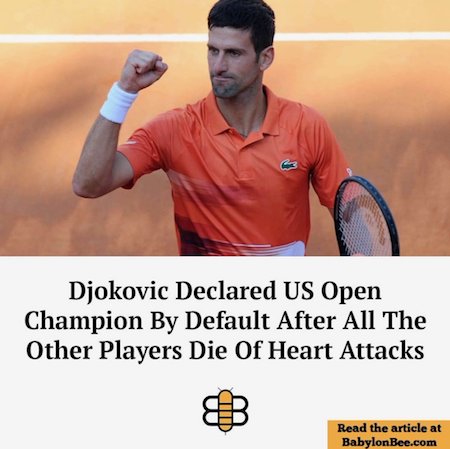


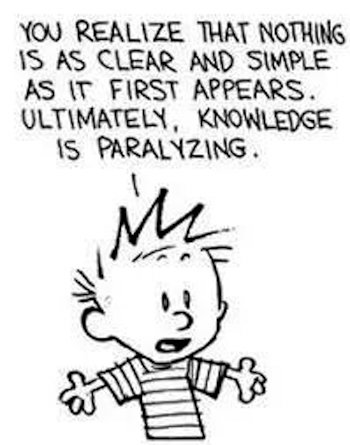

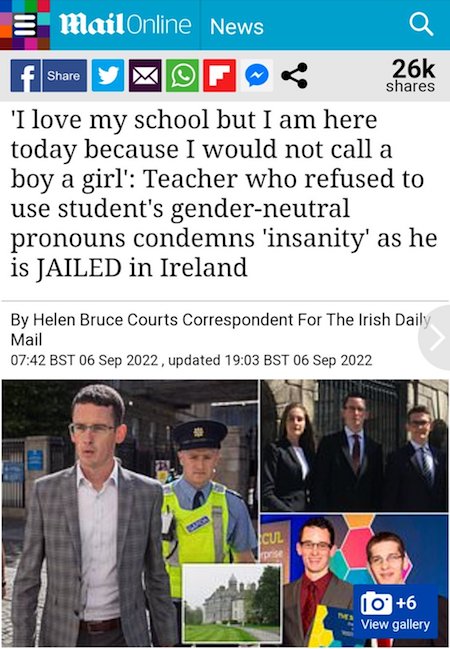

Malone
Part 1/2
A Message From Dr. Robert Malone pic.twitter.com/OXy0hq8b0p
— ZN2 (@ZN2_______) September 6, 2022

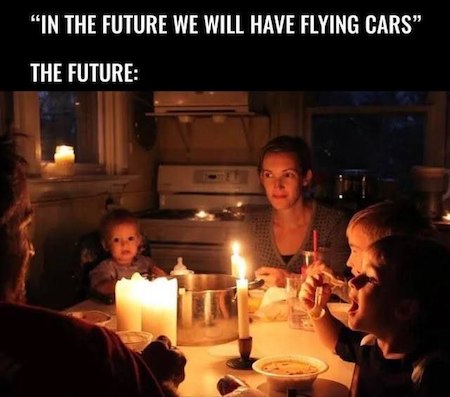

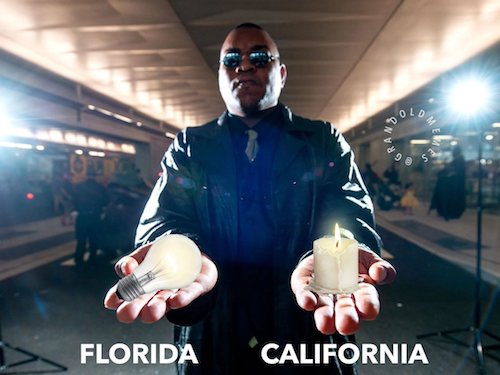

Webb test kits
How do hide and spring a pandemic on the President if you are Matt Pottinger working for Trump. Start with the test kits. pic.twitter.com/RqHnBR688i
— George Webb – Investigative Journalist (@RealGeorgeWebb1) September 7, 2022

Support the Automatic Earth in virustime with Paypal, Bitcoin and Patreon.








